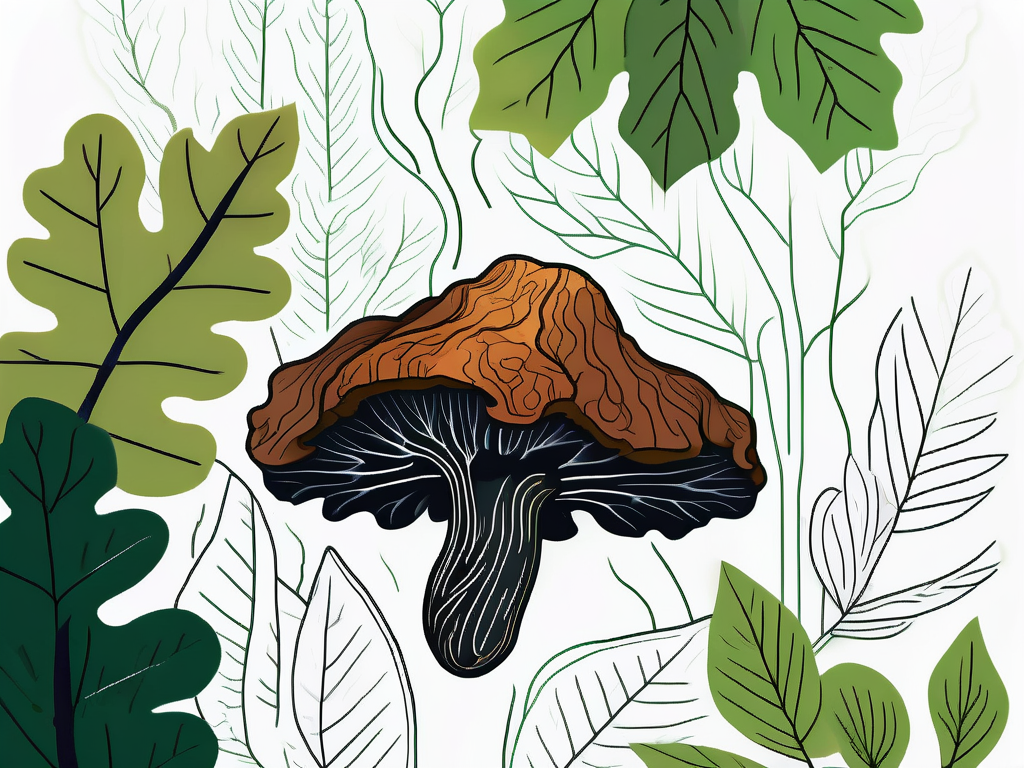Popular mushroom adaptogens: Chaga

Discover the powerful benefits of Chaga, one of the most popular mushroom adaptogens.
Popular mushroom adaptogens: Chaga
Chaga, a popular mushroom adaptogen, has gained significant attention in recent years for its potential health benefits. This article aims to provide a comprehensive understanding of chaga, exploring its basics, role as an adaptogen, health benefits, and different ways to incorporate it into your diet.
Understanding the Basics of Chaga
Chaga, scientifically known as Inonotus obliquus, is a type of fungi that grows on birch trees in cold regions, such as Siberia, North America, and parts of Europe. It has a unique appearance, resembling a black, charcoal-like growth protruding from the tree's bark.

Chaga is often referred to as the "King of Medicinal Mushrooms" due to its potent health benefits and long history of traditional use. It is highly valued for its immune-boosting properties and is believed to support overall wellness.
What is Chaga?
Chaga is not your typical mushroom. Instead of a fruiting body, it forms a hard, woody mass called a sclerotium. This part of the mushroom is used for medicinal purposes. Traditional cultures, particularly in Siberia and Russia, have used chaga for centuries to support overall well-being.
When chaga is harvested from birch trees, it is carefully dried and processed to preserve its bioactive compounds. These compounds are what give chaga its powerful medicinal properties, making it a popular natural remedy in traditional medicine practices.
Origin and History of Chaga
The use of chaga dates back centuries in Russia, where it was known as the "Mushroom of Immortality." Native tribes in Siberia and other cold regions also utilized chaga for its perceived health benefits. In recent years, it has gained popularity in the West as a natural health supplement.
Chaga has a rich cultural history, with indigenous peoples incorporating it into various rituals and healing practices. Its reputation as a symbol of longevity and vitality has transcended generations, making it a revered natural remedy in many cultures around the world.
Nutritional Profile of Chaga
Chaga contains an array of beneficial compounds, including antioxidants, polysaccharides, betulinic acid, and melanin. These compounds contribute to its potential health effects.
Antioxidants found in chaga help protect the body from oxidative stress and inflammation, while polysaccharides support immune function and overall health. Betulinic acid, a triterpenoid compound unique to chaga, has been studied for its anti-cancer properties, showing promising results in various research studies. Melanin in chaga contributes to its dark color and may have protective effects on the skin and eyes.
The Role of Chaga as an Adaptogen
Before delving into the specific health benefits, it's crucial to understand what adaptogens are and how chaga fits into this category.
Adaptogens have a long history of use in traditional medicine systems, particularly in Ayurveda and Traditional Chinese Medicine. These natural substances are revered for their ability to help the body adapt to physical, mental, and environmental stressors. By supporting the body's ability to maintain balance and homeostasis, adaptogens enhance resilience and overall well-being.
Defining Adaptogens
Adaptogens are natural substances that help the body adapt to physical, mental, and environmental stressors. They work by supporting the body's ability to maintain balance and homeostasis, enhancing resilience and overall well-being.
One of the key characteristics of adaptogens is their nonspecific action, meaning they have a normalizing effect regardless of the direction of the body's initial condition. This unique quality sets adaptogens apart from other substances and highlights their ability to modulate the body's response to stress.
How Chaga Functions as an Adaptogen
Chaga has been recognized as an adaptogenic mushroom due to its potential to enhance stress resilience and support various physiological functions. Research suggests that chaga's adaptogenic properties may help improve energy levels, reduce fatigue, and promote overall vitality.
Chaga, scientifically known as Inonotus obliquus, grows predominantly on birch trees in cold climates. It has a long history of use in Siberian and Baltic folk medicine for its potential health benefits. Chaga is rich in bioactive compounds, including polysaccharides, beta-glucans, and antioxidants, which contribute to its adaptogenic properties.
Health Benefits of Chaga
Chaga, also known as Inonotus obliquus, is a type of fungus that grows on birch trees in cold climates. It has been used in traditional medicine for centuries, particularly in Russia and other Baltic countries. Chaga is associated with several potential health benefits, making it a popular choice for those seeking natural remedies.

One of the key health benefits of chaga is its immune system support. Chaga contains compounds such as beta-glucans and polysaccharides that may help support a healthy immune system. Preliminary research suggests that chaga's immune-modulating properties may enhance immune response and promote overall immune function, making it a valuable addition to one's wellness routine.
Immune System Support
Chaga contains compounds that may help support a healthy immune system. Preliminary research suggests that chaga's immune-modulating properties may enhance immune response and promote overall immune function. The beta-glucans in chaga are known for their ability to activate and modulate the immune system, potentially helping the body defend against infections and illnesses.
Another notable benefit of chaga is its antioxidant properties. Antioxidants are essential for protecting the body against oxidative stress caused by free radicals. Chaga is rich in antioxidants, such as superoxide dismutase and melanin, which may help reduce inflammation, support cellular health, and provide overall antioxidant support. Including chaga in your diet or as a supplement could potentially help combat oxidative damage and promote overall well-being.
Antioxidant Properties
Antioxidants play a vital role in protecting the body against oxidative stress caused by free radicals. Chaga is rich in antioxidants, which may help reduce inflammation, support cellular health, and provide overall antioxidant support. The melanin in chaga, in particular, is a powerful antioxidant that can help neutralize free radicals and protect cells from damage, contributing to overall health and longevity.
Additionally, chaga has been studied for its potential anti-cancer effects. While chaga is not a cure for cancer, some studies indicate that it possesses potential anti-cancer properties. The active compounds in chaga, such as betulinic acid and polysaccharides, have demonstrated anti-tumor effects in certain lab and animal studies. These compounds may help inhibit the growth of cancer cells and induce apoptosis, or programmed cell death. However, more human research is necessary to determine the full extent of chaga's efficacy in cancer prevention and treatment.
Potential Anti-Cancer Effects
While chaga is not a cure for cancer, some studies indicate that it possesses potential anti-cancer properties. The active compounds in chaga, such as betulinic acid and polysaccharides, have demonstrated anti-tumor effects in certain lab and animal studies. These compounds may help inhibit the growth of cancer cells and induce apoptosis, or programmed cell death. Incorporating chaga into a comprehensive cancer treatment plan may offer some benefits, but it should not be used as a standalone treatment without medical guidance and supervision.
How to Incorporate Chaga into Your Diet
There are various ways to include chaga in your daily routine. The following are popular methods:

Chaga Tea and How to Brew It
Chaga tea is a common way to enjoy the benefits of this adaptogenic mushroom. To prepare chaga tea, you can simmer chaga chunks or powder in hot water for several hours, allowing the beneficial compounds to infuse into the liquid. It is recommended to consult a healthcare professional regarding the optimal chaga tea brewing process for your specific needs.
When brewing chaga tea, it's important to note that the longer you simmer the chaga, the more concentrated the tea will become. This means that you can adjust the strength of your tea to suit your personal taste preferences. Some people prefer a milder flavor and choose to simmer the chaga for a shorter period, while others enjoy a robust and earthy taste and opt for a longer brewing time.
Chaga Supplements: Pros and Cons
If brewing tea is not your preference, you can opt for chaga supplements available in various forms such as capsules, powders, or extracts. Supplements offer a convenient way to incorporate chaga into your daily routine. It is essential to choose high-quality supplements from reputable sources to ensure their efficacy and safety.
When selecting chaga supplements, it's important to read the labels carefully and choose products that contain pure chaga extract without any fillers or additives. Additionally, it's advisable to start with a lower dosage and gradually increase it as you assess your body's response to the supplement. This allows you to find the optimal dosage that works best for you.
Cooking with Chaga: Recipes and Tips
Chaga can also be added to various culinary creations, including smoothies, soups, and baked goods. Its earthy flavor can provide an interesting twist to your favorite recipes. Experimenting with chaga-infused dishes can be an enjoyable way to incorporate it into your diet.
When cooking with chaga, it's important to note that the mushroom needs to be properly prepared before use. This typically involves drying and grinding it into a fine powder. The powder can then be added to your recipes, allowing the chaga to infuse its unique flavor and potential health benefits into your dishes. Whether you're adding it to a hearty soup or a delicious smoothie, chaga can elevate the taste and nutritional value of your meals.
In conclusion, chaga, a popular mushroom adaptogen, offers a range of potential health benefits. Whether consumed as tea, supplements, or added to recipes, chaga provides a convenient and natural way to support overall well-being. As with any natural supplement, it is advisable to consult a healthcare professional before incorporating chaga into your routine to ensure it aligns with your unique needs and existing health conditions.











